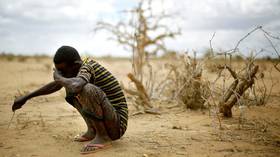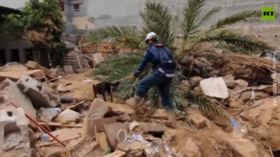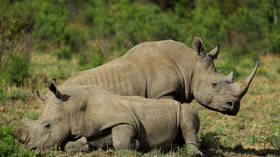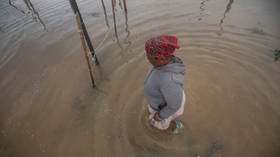Vsevolod Sviridov: The West is using its climate agenda to hold back African development

As the continent internationally recognized to be most at risk from climate change, Africa also suffers directly from Western attempts to rescue it. The imposition of an external climate agenda on the continent only preserves the West’s technological superiority and keeps Africa dependent on it.
With that in mind, a more recent scramble to establish external control over strategic national infrastructure in Africa, such as the Grand Ethiopian Renaissance Dam (GERD), carries considerable risks for the continent’s population.
Water is the basis of life
Water resource management is an important part of any climate agenda that strives to serve the interests of developing countries in Africa. Not only does it mean providing access to drinking water and generating electricity at hydroelectric power plants, but it also refers to creating irrigation infrastructure for agriculture, aquaculture, and forming regulatory and technological frameworks for industrial water resource management (drainage, mining, offshore oil production, the exploitation of East African Rift Lake resources, etc.).
Meanwhile, the West’s “climate agenda,” developed for its own needs and interests, focuses on reducing CO2 emissions but neglects the issue of water supplies. Moreover, if the “water issue” were solved for good, this would reduce Africa’s dependence on the West, deprive Western businesses of cheap seafood supplies, and boost the development of Africa’s agricultural sector, thereby reducing food imports to the continent.
The world’s freshwater reserves are estimated at 43,000 cubic km/year. According to the Food and Agriculture Organization (FAO), Africa accounts for about 9% of these reserves. On average, that comes down to 5,000 cubic meters of fresh water per person, per year. To compare, in Europe this figure is 9,000, and in Asia – 3,400. Africa has major river systems such as the Congo (the third largest river in the world by volume), the Niger, the Zambezi, the Nile, the Cross, and the Sanaga. It also has some of the largest freshwater lakes in the world by volume, such as Tanganyika (second largest by volume after Lake Baikal), Malawi, Victoria, Kivu, Turkana, Albert, and others and also boasts significant reserves of underground fresh water, such as the Nubian Sandstone Aquifer System.
Despite this, problems with access to water greatly influence Africa's social and economic development and have an impact on the security of the continent. The basins of more than 80 African rivers and lakes are shared by several countries: the Nile Basin is shared by 11 countries, the Niger flows through 10 countries, and the Congo flows through nine countries. Issues of water resource distribution between the countries, construction of hydroelectric power plants, reservoirs and irrigation have become important aspects of international relations in Africa.
On the same continent we can find countries such as Gabon – which, according to the World Bank, had 73,000 cubic meters of internal freshwater resources (i.e. rivers and precipitation) per capita as of 2019 – and Egypt, where this indicator was just nine cubic meters. Therefore, Africa’s problems are not related to the shortage of fresh water but uneven distribution of it and a lack of infrastructure for its purification, transportation, and storage. Experts also note low development of renewable water resources (about 4%).
Water scarcity is particularly severe in the Sahel region, where it is aggravated by forest loss, the spread of the Sahara desert, and soil degradation due to cattle herding. These factors lead to increasing social tensions and security issues. Competition for access to water is becoming one of the main reasons behind West Africa’s current challenges (including terrorism, extremism, and the growth of interethnic and interreligious tensions).
Access to fresh water will become a key issue for North Africa, the Sahel-Saharan zone, the Horn of Africa, and the over-urbanized and arid areas of southern Africa (South Africa, Namibia, Botswana). The solution to the problem should be multifaceted, and the main costs would go into finding water (by drilling and other means); the design and construction of irrigation systems; water pipes, sewage, and sewage treatment plants; the regulation of water use at the level of international associations; and possibly, even projects on importing fresh water.
According to UN forecasts, by 2030, over 200 million people in Africa will live in regions where access to water is problematic. Migration and water-related conflicts pose a risk recognized by many African governments and intergovernmental associations. However, projects aimed at combating the effects of climate change meet with a number of challenges, including security risks (high levels of conflict in the areas of implementation), a lack of funding, as well as unreliable and incomplete data used for the conceptual design of such projects.
Western businesses and international development assistance agencies are not eager to invest in large water projects and limit themselves to supporting local-level initiatives. Often, such local projects are implemented by companies involved in mining projects nearby, as part of corporate social responsibility. In other words, while with one hand these companies implement small projects to improve access to water, with the other hand they pollute water sources with chemicals and destroy ecosystems.
It is important to note that the largest hydroelectric power plants in Africa have been built or are being built by African countries in cooperation with Chinese, Brazilian, and Russian companies. But even in such cases, African governments often fall prey to the interests of foreigners. For example, projects implemented by Chinese companies are primarily aimed at generating electricity for the energy-intensive projects of other Chinese companies that deal with the extraction of mineral raw materials.
Unity for development
So far, Africa has not conducted environmental and water resource monitoring. Countries on the continent do not have the necessary resources and access to geological exploration maps made by Western companies, and African governments do not possess enough information (such as data on the dynamics of changes in river levels). The political crisis over the GERD dam, which is being built in Ethiopia, also continues. Egypt and Sudan fear that if the dam is launched, the water level in the Nile will fall, leaving them without water. For some reason, however, not a single study has been published that would either refute or prove this suspicion.
In this regard, the steps being taken by African countries themselves are particularly important. The African Union’s “Agenda 2063” declares that by 2030 the problem of access to drinking water on the continent should be solved through the use of new technologies, the circulation of new water resources, and water treatment procedures. The African Ministers Council on Water has been created under the auspices of the African Union and is focused on solving the issue of access to water resources. The water issue is also reflected in the declarations of the African Union, and most countries on the continent are adopting legislation to help solve the problem at the national level.
Pan-African steps, however, must be complemented by regional and trans-regional initiatives. For example, from October 26 to 28, the Republic of the Congo will host the Three Basins Summit (implying the basins of the Amazon, the Congo, and the Borneo-Mekong rivers). The summit’s immediate agenda is ecology, since these countries are home to the planet’s “green lungs” – 80% of the world’s tropical forests. One of the proposed goals of the summit is to help create the first global coalition to restore 350 million hectares of terrestrial and aquatic ecosystems.
The program of the summit includes three sessions: technical, ministerial, and high-level. The discussions are designed to promote scientific and technical cooperation, encourage capacity building, and exert greater influence on multilateral environmental protection forums. The event is also aimed at developing a common strategy to stimulate investment projects on combating climate change and preserving biodiversity.
Importantly, this summit also clearly demonstrates how the countries of the Global South are coming together and strengthening the multilateral approach in their diplomatic policy. Last year, speaking at a summit in Brazil, President of the Republic of the Congo Denis Sassou Nguesso expressed the wish that a “multipolar world” would no longer be just a fashionable phrase, but would become a political reality that “matches the power and fertility of the two rivers, the Amazon and the Congo.”
In the next ten years, environmental challenges will have a significant impact on the political agenda. The problems caused by climate change, the destruction of the traditional habitat, biological diversity, and water scarcity will become more severe. These will be key issues for both the population and the politicians. The search for balance between the sustainable preservation of the environment and development will become an important part of the agenda for local authorities and communities, as well as international associations. The issue of preserving national sovereignty in matters of environmental management will also become highly important. African nations will consistently object to any external control over natural resources and ecosystems, including rivers.
Creating and developing public services, including specialized programs (such as ecological monitoring) will be an important condition for progress. Ecological monitoring, however, is impossible without digitalization, including digital images of ecosystems which are updated in a timely manner. Such projects may be called the “Internet of the Environment" (IoE), analogous to the “Internet of Things” (IoT).
















